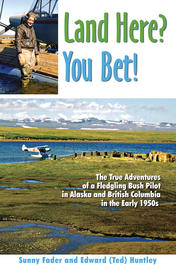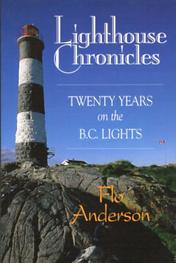Transportation


Land Here? You Bet!



Green Island was the northernmost manned lightstation in Canada, at about the same latitude as the north end of James Bay in eastern Canada where it joins Hudson's Bay, or Indian Harbour in Labrador. Dundas Island to the south protects Green Island from the seas in Hecate Strait, but the lightstation is fully exposed to the eighty-mile long Portland Canal to the north, which has a glacier at the head. When low pressure Pacific systems suck interior high-pressure air through the narrow canal-which is most of the time-the result is hurricane,force winds battering Green Island. After we left, an anemograph was installed and winds of 114 knots were recorded. Inside the house, we could tell the strength of wind by the different creaks, whistles and roars of the building. The noise in the house resulting from these winds was so loud that we had to shout, and we developed a system of body language and eye messages to communicate.
At low tide, the island is about a thousand feet long and nine hundred feet wide, six times the size of a football field. At extreme high tide, the area is halved. At this latitude the tides range up to twentyfour feet, about the height of a two-storey building. Green Island was within rowing distance, two miles, of Dundas Island. We could see the southern point of Alaska nine miles away, and the tips of trees and the lighthouse tower at Lucy Island, fifteen miles southeast.
There were no trees on this mass of ice, but in spring a few patches of grass among the rocks broke the monotonous landscape. In spring we discovered, at low tide, a bar of seashells joining the main island with a small rock island. The crystal clear blue-green water lapping the pristine white beach brought memories of hot tropical - minus the hot - coasts. Later, at high tide, we saw killer whales slide across this white shell bar, now many feet below the water's surface.
When we arrived, there was no junior keeper. He had left some time previously (we assumed he quit when all the facilities in his house froze and there was no fuel) and there was no replacement. Garry was asked to fill in until the competitions for a junior keeper were held and processed. It gave us a break to have Garry with us. Among other things, he stood watch during the night. As the helicopter was down for repairs, Stan did not get home for Christmas.
A new junior keeper eventually arrived and Garry was taken to another lighthouse for a relief job. This new keeper was a widower and a pleasant man. We gratefully settled into the routine of work and schoolwork.
The girls could not go outside during the winter except on rare occasions, so as a diversion they started teaching tricks to the dog who had been left behind (we did not shoot him!) - a beautiful, gentle black spaniel named Nugget. They were so delighted to lavish attention on this dog and he thrived. It took a long, long time to teach him any tricks, though. I would hear Beth in the basement saying over and over again, "Roll. Roll." I teased her, saying, "He is just one of those dogs that can't learn." They paid no attention to me and kept at it day in and day out. Eventually, he rolled! After that he caught on quickly and learned many tricks. Later we found out he had had an ear infection, so perhaps his hearing was gone and it took longer to learn by gestures. We found out why he had been banished to a lightstation. He was the runt of a litter of a dog owned by one of the helicopter pilots and he had been pampered. Then, when left alone, he howled and kept on howling until he had company. This was not acceptable behaviour in a city!
Beth was fifteen years old now, and was confined to the house with no peers, no TV, no radio. But she had always been a great reader and now entertained herself by reading the several hundred romance novels left behind in the basement. She devoured every last one of them. I don't think she has read one since! Unfortunately there was no wonderful travelling library for Green Island.
Our life was quite settled, but I was still nervous about the high winds of winter and the massive swells and waves so rough no ship could approach. The station radio transmitter receiver was located in our basement instead of an engine room or radio shack, because when the wind blew it was impossible to get out to the other buildings. One time I tried to go out the basement door to get Trev in the engine room, ten feet away. As I stepped outside I was immediately slammed back against our house by the savage wind and pinned there, helpless, until a brief lull let me open the basement door and whip inside our house again. I tried not to think of our precarious position if there was an emergency. The pilots had assured me that they could hover to pick someone up if the wind dropped to 50 knots. That was some consolation, but I still felt isolated from help and was sleeping lightly.
The Heathkit marine radio receiver Trev had built at Lennard Island was in our kitchen and always on the AM frequency used by the lightstations. One night after we had gone to bed I heard Prince Rupert calling any lightstation to answer. Trev was in a very deep sleep and they kept on calling, so I got up, went to the basement, lifted the microphone, pressed the button and said, "Prince Rupert radio, this is Green Island, were you calling?"
They replied, "Oh yes, Green Island, we have a tidal wave warning. It is approaching your station and will be there - NOW!"
My mind conjured up an immediate image of a wall of water rushing to our shore. I pressed the button again and cried, "What do we do?"
"Get the lightkeepers up!"
Cursing under my breath, I raced upstairs calling Trev. I rushed to the girls' bedroom to rouse them, dig out all the warm clothes I could lay my hands on, and help them put on layer after layer - all the time thinking about that cold, cold, cold water rushing toward us. Trev was at the door by this time asking me what I thought were damn fool questions instead of doing something, anything! Of course, he was thinking. We got together a mattress, food and blankets and helped the children and the dog up the metal ladders through a trapdoor to the top of the forty-foot concrete tower. We thought this was the sturdiest, highest and safest place on the island. We left them there. Then we told the junior keeper, who was up on shift in his house, and invited him to come with Trev and me to our house to listen for further news on the marine radio and broadcast radio.
The tidal wave had been generated by a severe earthquake in Alaska. We didn't know it at the time, but we were not in danger. The tidal wave came through Dixon Entrance which broadens in our area and then narrows again toward Prince Rupert. Prince Rupert Harbour suffered severe damage as did places south, including Port Alberni on the west coast of Vancouver Island. But we did not. Trev surveyed our island at daylight and could not see that any logs or debris were higher than usual. But believe me, if I could have gotten off that island that night I doubt I would ever have returned.
Eventually the lulls between storms grew longer and we could sometimes even get outside. The tender came with a welcome load of cut wood. The ton of coal had not lasted very long with the wind-chill of that winter!
As the ice melted, we looked around the island for new possibilities. I, the eternal optimist, decided to plant a garden in the spring. Although the soil was shallow and rocky, fertilizer had worked before and maybe such things as turnips, Russian kale and cabbage would have some success. That turned out to be true. The turnips were winners, some eight inches across and so many we gave sacks away to the pilots. Cabbages did well also and the carrots and Russian kale added variety to our diet. Even my little flower garden produced a few blooms.
The weather was getting better by the day and with it the unique spring and summer features of our island. Green Island was a rookery for seagulls, guillemots and oystercatchers. It was our first opportunity to observe the cycles of returning, mating, hatching of young and migrating in the fall. We counted more than five hundred seagull nests. Adrienne was overjoyed when the young hatched; she had fifteen hundred babies to check every day. The adult birds were not happy to see her and would dive at her, sometimes hitting her head with a breast or deadly aimed poop. That didn't stop her. She just donned her dad's hard hat and a raincoat and cheerfully continued her inspection and petting.
This quiet, gentle and loving little girl, seven years old, amused herself without peer playmates, often without siblings and with her parents taken up with the battle for basic survival. She never came to us asking, "What can I do now?" Instead she created absorbing activities for herself.
Once, she asked if she could take two gull chicks for pets. She was a real mother hen, up at dawn to collect bullheads from the tidal pools, wheeling the chicks around in her doll buggy. Nugget, the dog, dressed in Adrienne's clothes, got a few rides too. I don't remember seeing many dolls in that buggy!
She named the chicks Squirt and Cheer. Like children after the Pied Piper, they followed her everywhere, growing and moving through all the stages of development. When they learned to fly they would swoop by outside her bedroom window at dawn, squawking for food. She would get up and capture delectable morsels for them!
One day she was so engrossed in her activities that she didn't notice the tide coming in, which it did at four feet an hour. Luckily Trev happened to be outside and noticed that she had been cut off by the rising water. He could still wade out and carry her to high ground. From then on she was much more cautious. Her unusual childhood teemed with practical lessons like this, with nature and self-directed discovery the teachers.





